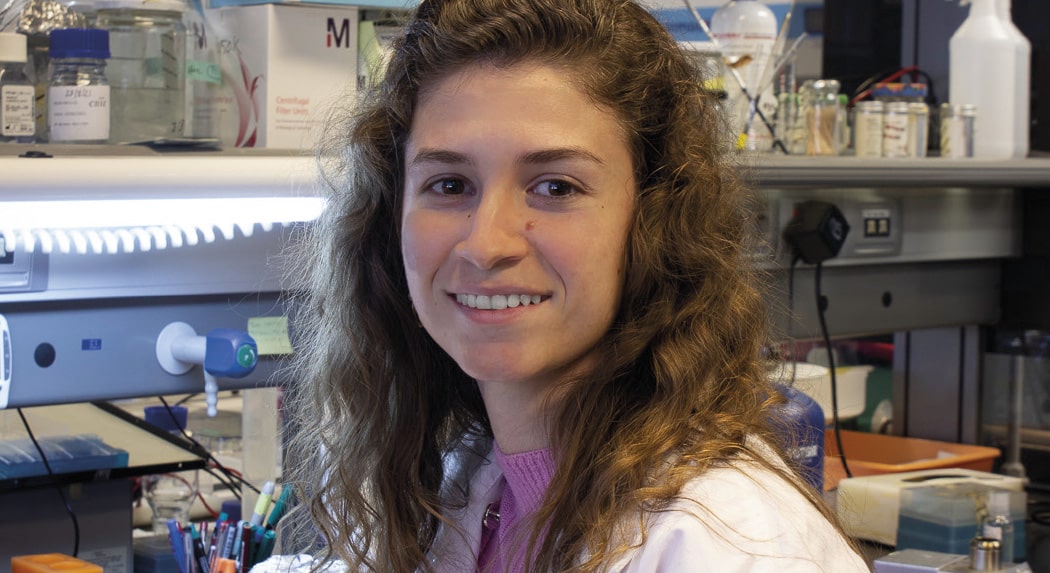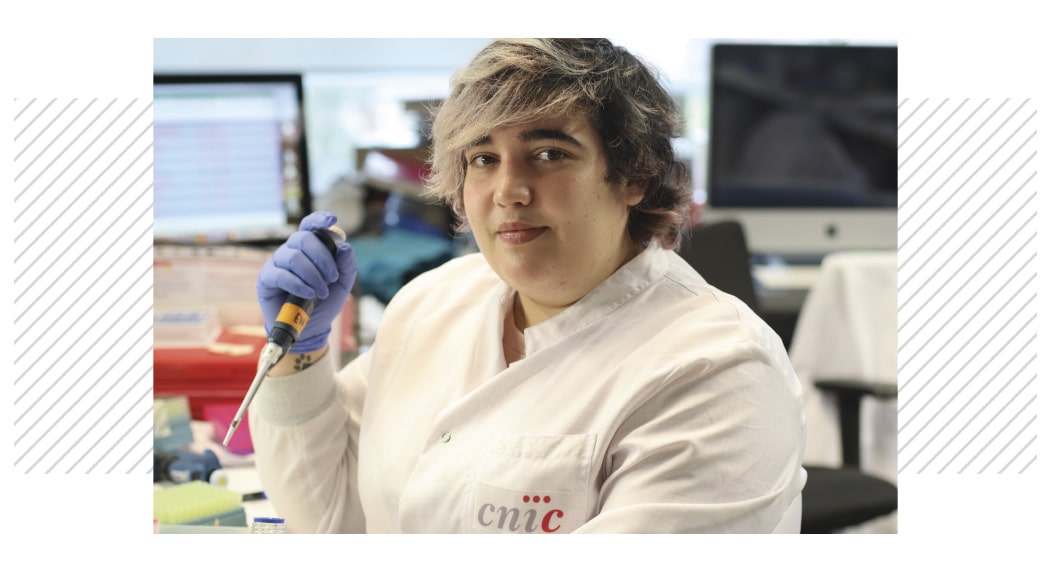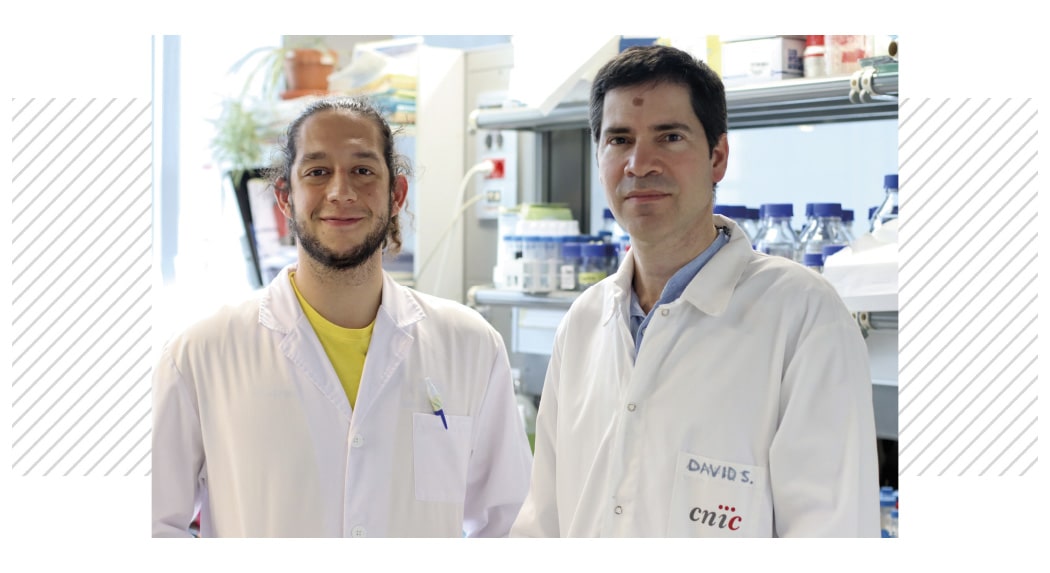DUAL Vocational Training: Learning and collaboration
CNIC has agreements with two vocational training colleges in the field of public health within the Autonomous Community of Madrid:
- IES Moratalaz – clinical and biomedical laboratory
- IES San Juan de la Cruz – imaging for diagnosis and nuclear medicine

One of CNIC’s training programmes is Dual Vocational Training, which combines a first year of academic study at an educational institution with a nine-month internship at CNIC during the second year, instead of the more customary three month work placements.
The CNIC has educational collaboration agreements with the only two schools or technical colleges that offer higher dual training in public health within the Autonomous Community of Madrid. IES San Juan de la Cruz: Advanced Vocational Training in imaging for diagnosis and nuclear medicine, and IES Moratalaz: Advanced Vocational Training in clinical and biomedical laboratory work.
Students work full-time in accordance with the established schedule for the place of work. The advantage of this type of internship is that it facilitates a practical learning experience thanks to spending a prolonged period in a real working environment.
The programme offers advantages for students, but also for the CNIC. Specifically, Dual Vocational Training represents a great opportunity to acquire training at the same time as first-hand experience of real working life.
Cristina ÁLVAREZ:
“It allows you to acquire knowledge in areas that interest you as you gain experience. This means that the possibility of finding a job in the future is made easier, as it was in my case”
Students experience practical training in a business, so that they “learn by doing” and the learning experience is focused on the needs of the business. As well as gaining access to an authentic productive environment and increasing their possibilities of accessing future employment, the students receive a training grant of 300 euros per month, and they figure as employed interns in the national social security system. For their part, businesses actively participate in training students as future professionals.
As Dr. David Sancho, Group Leader of CNIC’s Immunobiology Laboratory comments, this type of programme, like all of its training programmes, are very positive “because they allow us to train students, which is a highly motivating task for us.” He goes on to say that students, “receive training in the tasks we do in a research laboratory that goes far beyond the theory they have studied.”
The benefit is mutual, he adds, because for the group that the student joins, “although it invests in training, the group quickly reaps the benefits of the intern’s thirst to learn and participate.”
Since the CNIC began its collaboration with Dual Vocational Training internships in the 2017-18 academic year, 15 students have trained at the Centre (6 in Imaging and 9 in clinical laboratories). Currently, two of the participants in this programme are under contract.
Cristina Álvarez Diago is one of the students who took advantage of the opportunity offered, and is now working in the CNIC’s Pluripotent Cell Technology Unit, led by Dr. Giovanna Giovinazzo.
Cristina had completed a degree in chemistry at the Universidad Autónoma of Madrid (UAM) in 2020 and found out about the programme when she was studying a two-year Dual Advanced Vocational Training in Clinical and Biomedical Analysis. The first year consisted of academic study, whereas the second was spent training in the workplace. “The college itself provided a list of centres, some focused on clinical analysis and others on research. Since I was interested in research, I chose the CNIC.”
The most serious problem that Cristina encountered is that she joined CNIC in the middle of the COVID-19 pandemic, but her first impressions were favourable, “within the limits imposed by the extraordinary situation at the time.”
She soon adapted to the workplace and had hopes of staying on to work at CNIC. “The working atmosphere was so good, and I felt so comfortable; of course I wanted to stay, and I never lost hope, but I also knew how difficult it is to get an offer of a contract at a research centre like CNIC.”
She now works as a laboratory technician in the Pluripotent Cell Technology Unit, on murine embryonic stem cells (mESC) and human induced pluripotent stem cells (hiPSC), as well as participating in all of the molecular biology techniques and work undertaken in the cell culture and other laboratories.

Eva Martínez Jiménez holds an Advanced Vocational Training Diploma in anatomical pathology and cytology and a dual higher vocational training qualification as Clinical and Biomedical analysis technician; she currently works as a laboratory and animal facility technician in the laboratory led by Dr. José Antonio Enríquez at CNIC.
Eva Martínez:
“They began my employment contract in August just after I completed the internship period, knowing that I was going to have a baby at the beginning of September, and the truth is that I am very grateful for that”
Before this, however, she had spent two years at the CNIO, the Spanish national cancer research centre, with a grant from the Autonomous Community of Madrid, and when this could not be renewed, she decided to study the first year of the dual qualification while working the last year of her contract.
“Afterwards, I did the placement for the dual with Dr. Enríquez’s group, and as the CIBER research organisation had money, that organisation offered me a contract. Initially, I wanted to be a forensic assistant, which is why I studied anatomical pathology and did an internship at Madrid’s Anatomical Forensics Institute, but it was very difficult to get work there, and I managed to get a contract with CNIO, the Spanish national cancer research centre, where I discovered what science was like on the inside, and I loved it.”
Eva highlights the fact that, at the time, she was pregnant, but this did not represent an obstacle for the group. “They began my employment contract in August just after I completed the internship period, knowing that I was going to have a baby at the beginning of September, and the truth is that I am very grateful for that. First, I had a CIBER contract to work with a CNIC group, and later I came top in a competitive selection process for candidates to work directly at CNIC.” She currently works in the animal facility.
Manuel Rodrigo Tapias is one of the students currently studying the programme. Manuel heard about the programme while he was applying for vocational training, and admits that he did not expect to find something that so fully coincided with what he was looking for. “I was pleasantly surprised to find that all of the theory was condensed into one year, and that the second was an internship.”
In Dr. David Sancho’s laboratory, Manuel focuses on genotyping functions and performing histological sectioning, and although he dreams of spending a longer time in this laboratory, he tries not to think about it.
For Eva, the length of the programme is very important. “A year is a very good amount of time in which to learn. Before, internships were six months, which was then cut to three, and in three months it is impossible to get practical experience of a job like this.”
For her part, Cristina highlights, “The high level of training that you have achieved once the year is over, and the many areas in which you can work autonomously.”
She considers that the programme might, “improve if there were a wider list of Advanced Vocational Training courses that could be taken in this dual mode, and I think that, little by little, this will be possible.”
She does not hesitate to recommend this type of training programme. “It allows you to acquire knowledge in areas that interest you as you gain experience. This means that the possibility of finding a job in the future is made easier, as it was in my case.”
Eva has a similar opinion. “With a bit of effort, you can learn the theory in one year, and then you have another to get the necessary work experience. Various students have come to do internships and there is an enormous difference between the ones that stay three months and those who spend a year.”
Manuel adds that the CNIC is, “A place full of wonderful people who have been willing to support and teach me both in and outside the centre.” He also remarks on how condensed the course is and how quickly the studies are completed. “This course is quite demanding and dense, but it is, without a doubt, well worth the effort.”
So he enthusiastically recommends this type of training. “Not only is it an excellent way to acquire the skills that you are really going to use in the world of work as a technician, but you also learn theory that is enormously useful if you intend to continue formal training.”
For Dr. Sancho, it is essential that students join the group with, “confidence, motivation, enthusiasm and a desire to learn,” and that they look on it as a “...unique opportunity to learn in a unique environment of researchers who not only have high scientific but also high human values, and who will be their colleagues in the laboratory. The main thing” -he adds- “is that they take advantage of this opportunity and adopt a proactive, organised attitude to make the most of their experience.”

Manuel is convinced that, even if he does not end up working at CNIC, “I will take a small part of it with me.” His motto is, “Manuel, make the most of the experience and the advice they give you here.”

















